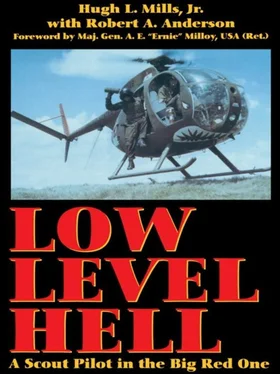After securing myself in the seat, I looked around the inside of the ship and was surprised at how little room there was. The captain had said that I was sitting where the crew chief-door gunner would sit in combat. If any of those guys was a six footer like me, they must have a heck of a time sandwiching in back with an M-60 machine gun!
I followed what was going on up front by watching through the little window in the bulkhead that separated me from the pilot’s compartment. I couldn’t see much of the magic that the captain was working to start the engine, but the turbine sound soon told me that we were getting ready to go.
The soft whine grew in intensity, and through the glass panel over my head I could see the four rotor blades begin to turn—slowly at first, then accelerating to a circular blur. The sound of the whirling rotors soon drowned out most of the earsplitting engine whine. Then, as if somebody had kicked us square in the seat of the pants, up we went.
Hot damn, I thought, this is all right!
We flew for fifteen to twenty minutes. In the front, the captain was explaining over the intercom what he was doing and what was going on,
It seemed as though we hadn’t anymore than gotten up when we landed again, in a small grassy field out in the country. After the captain shut down the engine, we unstrapped and walked over to a little airport building where we had a cup of coffee and talked. I was having fun asking questions and listening to the captain, but I couldn’t wait to return to the OH-6 for the ride back to Knox, in the front seat this time.
I eagerly climbed into the front seat, hooked the harness, and slipped on the helmet. I felt a tremendous exhilaration, and a fascination with the machine.
I was lost in thought when the captain’s voice popped into my earphones, startling me. He showed me the button on the cyclic stick that I could push to talk back to him, then briefly explained his pre-flight checklist and engine-starting procedures.
Up again and headed back toward Fort Knox, the captain demonstrated the basic helicopter controls: the collective pitch stick, which made the ship go up and down; the cyclic stick, which controlled the longitudinal pitch of the aircraft; and the foot pedals, which made the ship go right and left. He then explained the purpose of all the buttons on the top of the cyclic stick: the radio-intercom, cyclic trim, gun pod elevation-depression, armament two-position trigger, and two or three others just for spares.
After we reached an altitude of about three thousand feet, the captain came back on the intercom. “OK, Mills, take the controls for a while and see what she’s like.”
A little hesitantly, I put my feet on the pedals and wrapped my hand around the pistol grip on the cyclic stick. I was thrilled. I was flying an army helicopter!
“Now look at the black ball,” he said, pointing to the instrument near the upper center of the instrument panel. “What you want to do is keep the black ball in the middle. When it slides out to the left, push a little left pedal until it comes back to the middle. Same to the right. Just step on the ball and keep flying toward the horizon.”
It worked just the way he said it would, but I found out very quickly that I shouldn’t try to monkey around with the controls. The less I did, the less the aircraft moved around.
All too soon we were back at Fort Knox airfield. Though I didn’t think that I flew all that badly, my fellow candidate in the back cabin was violently airsick when we got down.
But not me. I was feeling good and was extremely excited by the entire experience. I decided on the spot that I wanted to go on to flight school after OCS and learn to really fly the army OH-6 helicopter.
My enthusiasm was duly noted by the captain but quickly forgotten by me. I still had about three months of OCS left, and that demanding schedule left me no time to think about helicopters or wonder whether my application would be approved.
During the last week of OCS, however, I learned that I had been accepted for army flight training. Somehow everything had fallen together. That excitement blended with the deep satisfaction I felt with graduating from OCS.
On 15 December 1967, members of Armor Officer Candidate Class 1-68 passed across the stage of Budinot Hall to receive their commissioning certificates.
It was a proud moment.
Though I had been approved for flight school, my orders hadn’t been cut yet to get me into Fort Wolters for Primary. The lapse gave me time to get in a couple weeks of leave. It was the Christmas season and a great time to be home with my family.
When the orders did come, they were the most unusual I had ever seen. In a couple of short paragraphs, they covered everything I was to do in the army for the next full year—from Fort Knox, Kentucky, to the U.S. Army Primary Helicopter School at Fort Wolters, Texas; from there to Advanced Flight Training School at Fort Rucker, Alabama; then home for leave; and, finally, on to assignment in the Republic of Vietnam.
So, with brand-new second-lieutenant bars on my shoulders, off I went to helicopter school, where I discovered that there was more to flying an army helicopter than watching the little black ball.
I didn’t waste any time after receiving my army aviator wings at the Rucker graduation ceremony. My gear was already packed in the back of my 390 GT, and I immediately headed back to Arkansas for forty-five days of leave at home. My Vietnam travel orders would be sent to me there.
Being home was a period of quiet anxiousness for me. Quiet because I didn’t do much, just saw some friends and water-skied. Anxious because I was ready to go to Vietnam. It meant a chance to test my newly acquired skills in combat situations, and I was comfortable with that. I had faith in my equipment, in the people who had taught me, and in the caliber of the people I would be flying with. I was ready for the next chapter of my life.
While I was at home, neither Mother nor Dad even brought up the subject of Vietnam. They knew that’s where my orders would send me, and there wasn’t anymore to be said about it. They were very much aware of what the war in Vietnam was all about. It was inescapable. They had been watching it on the TV news for several years.
Mother did, however, ask me one day, “Hugh, how do you keep your head down in a helicopter?” I remember answering, “With a great deal of difficulty!” That kind of flippant response was pretty typical of me. I guess it satisfied Mother because she didn’t mention it again.
My Vietnam orders finally arrived, instructing me to report to San Francisco on 30 December 1968 for transportation to USARV (United States Army Republic of Vietnam).
On New Year’s Day, 1969, I was in Saigon, getting off the bus in front of the headquarters of the 90th Replacement Battalion. This was where we would be processed into the country and receive our tactical unit assignments. For the first time, I felt a twinge of apprehension. I knew where I wanted to be assigned: the 1st Cavalry Division (Airmobile), the outfit I had seen so much of in all the training films at flight school. I perceived 1st Cav as the premier unit making Vietnam combat history, and setting the pace on aviation tactics and technology. My second choice was the 11th Armored Cavalry Regiment. Known as the Blackhorse Regiment, this was an old regular army outfit that dated back to action in the Philippine Insurrection, Mexican Expedition, and World War II. It had been in Vietnam since ‘66, and had made a lot of headlines during 1968, when it was commanded by then Col. George S. Patton III.
But after three days of processing at the 90th, when my assignment was finally posted I was bitterly disappointed to read “1st Infantry Division.” My first thought was, oh my God, what kind of justice would send an armor officer to an infantry division? I was in sheer panic. I wanted desperately to fly scouts, and I didn’t know how I could cope with being assigned to a Slick (troop-carrying utility missions) outfit… in an infantry division!
Читать дальше












